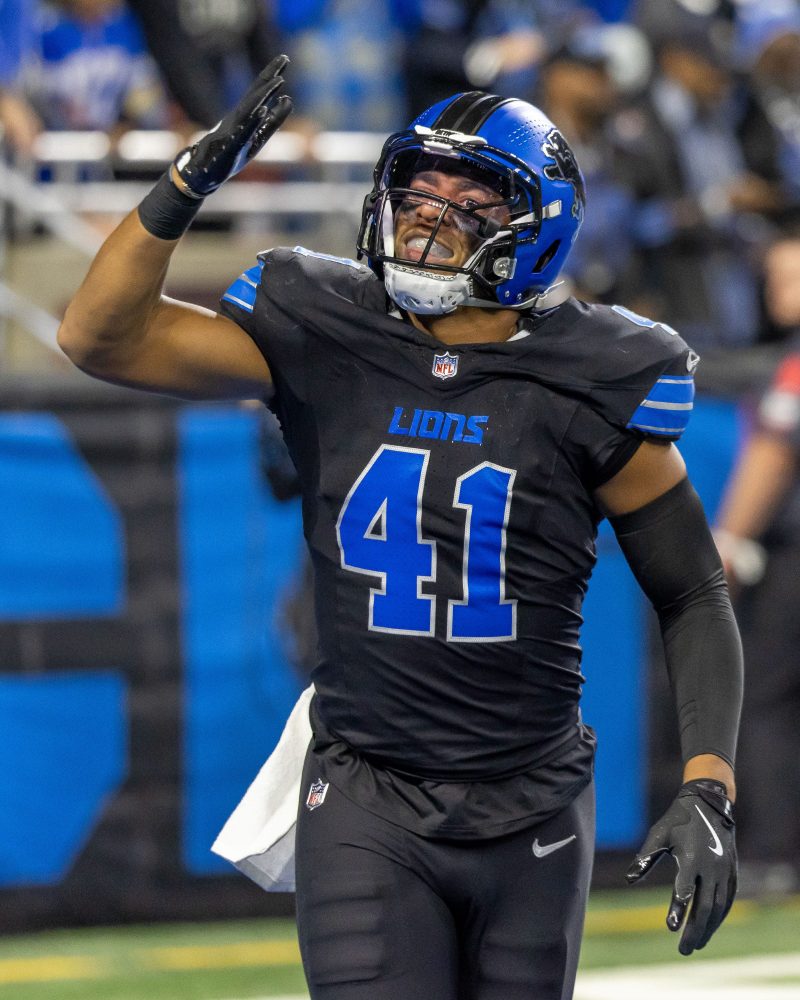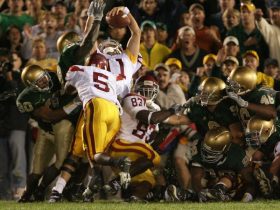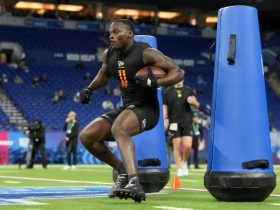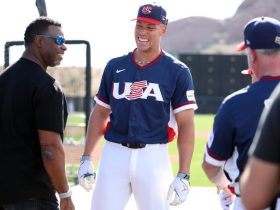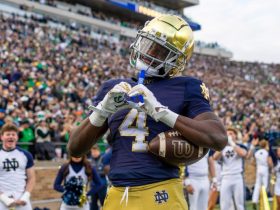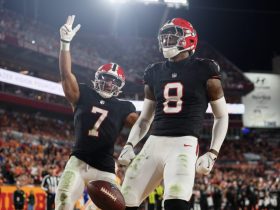- Detroit Lions linebacker Anthony Pittman was often overlooked in youth sports, even being cut from his high school baseball team.
- Pittman credits sports with teaching him life skills, creating lifelong friendships, and helping him connect with people from all walks of life.
- He now hosts youth football camps and partners with organizations like Playworks to encourage kids to stay active and join a team.
Have you ever been that kid who felt overlooked in sports?
Anthony Pittman, a Detroit Lions linebacker whose team kicks off the 2025 season on Sunday, Sept. 7 against the Green Bay Packers in one of the opening weekend’s marquee matchups, was once far out of view.
His first love was baseball, and he was cut from his high school team. Only then did he shift strictly to football. He didn’t even have a highlight video when he completed his senior season at Birmingham (Michigan) Groves High.
But he loved the feeling sports gave him – that instinct he always seemed to have to move – at least after he cried to his mom about going into his first basketball game.
‘I just did it because my friends did it and my best friend did it,’ he says. ‘I always was doing a sport. I went from basketball to soccer. I went from soccer to baseball and then eventually (to) football. It’s just always been a part of my life, being a part of a team, being able to have something to look forward to after school was over, and just hanging out, having a close-knit group of friends. I still talk to guys today that I’ve played on teams with from pre-K basketball.’
When Pittman, 28, looks out onto Ford Field, where he helped host a coed kids flag football jamboree in March, or his Detroit Dreamers youth football camp he ran at Wayne State, his alma mater, he sees himself. Perhaps he’s hopping into his mom’s 2002 Honda Odyssey, which drove him all over the city for games, and into the suburbs, where he moved and played high school football.
He loves the looks on the faces of kids when they see him, the reception he gets, even if it’s not what he might expect.
‘It’s funny because, like half of them didn’t believe me,’ he said at the jamboree in March. ‘They’re like, ‘Who are you?’ And I’m like, ‘I thought the jersey would give it away.’ ‘
Pittman never thought he’d play college football, let alone in the NFL.
‘When I was young, it would have been cool to hang out with a Lions player,’ he tells USA TODAY Sports. ‘So that’s really the thought process behind it. I’m just like, ‘Yeah, let’s go hang out.’ I ain’t big time. I’m just another guy, coming to play with the kids. Community service around Detroit, it just feels right to me. It’s just special being able to go around to see where you grew up, went to school.’
He spoke to us about why he can look into boys’ and girls’ eyes and urge them to keep playing. You never know what you might get out of sports, or where they might lead you.
Sports creates a locker room for life
They have led Pittman back home, to Belle Isle in the Detroit River. He fished for smallmouth bass while he was being interviewed for an ‘Under The Helmet’ mini-documentary for Detroitlions.com a few years ago.
After he caught one, he called his mom, Katrina Lyman, to reminisce about growing up in the city.
‘You know what I reflect about?’ she says. ‘It didn’t matter where you went, what community you were in, you were able to make connections with people. And I think that’s your gift. Just people from like all walks of life and different communities and different places, you found a way to connect with everyone.’
Her words made him think about the locker room, where you meet players of all shapes and sizes, of all interests, of all abilities, but you come together for a common purpose.
‘Coach (Dan) Campbell said it,’ Pittman says in the documentary, ”If the world was like the locker room, the world would be a better place because we’re all different.’ You can’t conform a certain people to be one way or another way. You just appreciate each other for what we are, and I feel like that’s what life should be.’
It’s in or near that locker room where he met some of the most influential male role models in his life, coaches in youth basketball, baseball and middle, high school and college football. He also met some of his best friends, which he would have whether he made it to the Lions or not.
‘Locker room is a big thing for me,’ he tells USA TODAY Sports. ‘I enjoy being around lots of people. I’m not the most vocal person, but even if I feel their energy and listening to guys, having a good time and chit chatting over there. So I think it’s important for kids to join a team and be a part of something that you’re working towards.’
Together we learn what it feels like to win and how to lose, a process that can start at the beginning.
WHY ARE BOYS SPORTS DECLINING? A former NBA star looks at solutions
Win or lose, there’s always another game
Think of those days you played tag in the schoolyard. Everybody’s running and moving, in and out and back in again.
The motion is at the heart of the message of Playworks, which partnered with the Lions to put on the flag football jamboree in March. The nonprofit organization provides staff instruction and teacher training to elementary schools across the country with safe and active games to play at recess.
‘It’s a way for kids to develop their physical skills, their relationship skills, their teamwork skills,’ says Elizabeth Cushing, Playworks’ CEO. ‘And it’s natural. Kids are intrinsically motivated to play, so we help create the conditions at school for every kid to get in the game, for it to be fun, for it to be welcoming, and for kids to explore games that they may not play without some introduction from adults.’
Instead of ones where you keep score, Playworks emphasizes contests where you are knocked out but quickly return. Take three-line basketball, where kids line up to play and rotate in and out after a basket. The team that falls short gets a high five and shifts back into line.
When a fifth grader leads a second-grade game, the message is even more powerful.
‘They are learning how to pay attention to the other kids,’ Cushing says. ‘When the 10-year-old gives a high five, they’re learning a lesson about how to be a teammate. … You have to rely on the other player, and so learning how to engage with them is really important early. We’re working with kids who want to play with each other, care less about who the other player is, and whether they’re similar or not. They’re more motivated by the play than anything, and we’re basically leveraging that. There is this very powerful under-the-surface, development that’s happening. We are creating players of the future, and we’re doing it with the motivation they have, which is to have fun.
‘That’s the secret of Playworks: They’re learning, and they don’t even know it.’
Boys and girls play foursquare and sharks and minnows when they’re young, and autonomous three-line basketball games or a coed developmental volleyball league held in the evenings when they’re in fourth or fifth grade.
‘The rules are play hard, have fun, respect the game, and we don’t keep score,’ Cushing says, ‘but the kids do.’
While they are on the playground, they are free to move from game to game, playing whatever they like. Like Pittman did.
We don’t have to discover our sports passion, or where we might pursue it, right away
Think of a young boy, slowly growing into a man, getting into his mom’s minivan, which takes him to baseball, ice hockey, golf and, eventually, the sport he settles upon in high school.
Pittman’s mom had to nudge him onto the floor that first time he played pre-K basketball. By the time he got to high school, he was drawn to some of his classmates. He wanted to wear a football jersey around campus on Thursdays and Fridays like they were.
Like when he was younger, the camaraderie through sports bred competition, and confidence.
‘It always gave me something to put my energies into,’ Pittman says. ‘I’m always doing something. I can’t sit still, so I go to school, I’m like, ‘Alright, I’m gonna knock this homework out because I got baseball practice at 6:30.’
‘We were always on the move, always doing something. And my mom, she was big on me being in sports. That’s the sacrifice that she made for me. It’s an investment. And now when I have kids, I understand parents investing in their children in sports, giving them something to focus on, work on, learn communication skills. It’s all life skills. And so that’s the investment she made in me. And as I get older, I recognize that, and I’m definitely grateful to her for that.’
Katrina Lyman had played volleyball at Detroit’s Cass Tech High. Anthony’s younger sister, Anna, also played the sport. He and his older brother, Trevell, participated in basketball and soccer together.
Anthony didn’t pick up football until seventh grade. He wasn’t an overnight success or highly recruited. But Wayne State, a Division II school in midtown Detroit, got a tip from his high school coach and heard about his new highlight reel.
‘I was like, ‘I don’t want to go to Wayne State; it’s a little too close to home,’’ he says. ‘I’d rather go somewhere out of state. But my mom was like, ‘Just take the visit, go meet the coaches, see if you like it.’ And I ended up loving it, loved the coaches, loved the facilities. I always tell people going to Wayne State was one of the best decisions of my life, I got my degree, had an excellent career playing football there, have friendships for life. So that’s kind of how it all worked out. It’s crazy because, I didn’t even want to do it.’
Get out there and play; it can bring out the best in us in whatever we do
Keith McKenzie, his linebackers coach at Wayne, told him his freshman year he had the potential to play in the NFL one day.
What McKenzie said gave Pittman confidence, but he tried not to think too much about it because he didn’t want to be let down by the ultimate outcome.
‘I didn’t imagine playing in the league,’ he says. ‘I just kind of just rolled with it as it came.’
He kept playing. It’s what he loves to do, and it’s ingrained in core lessons Playworks and the Lions promote when they collaborate.
‘We are based on the idea that play brings out the best in kids and the best in humans,’ says Cushing, Playworks’ CEO.
She is a mother of three now in their 20s – a daughter Hayden and sons Walker and Anders – who played high school sports. Hayden got third place in the Northern California high school sectionals at badminton while Walker was all league defensive player of the year at lacrosse.
About 20 years ago, she took a job at Playworks with the idea she could support their play, and really that of everyone. She had played high school tennis but never considered herself an athlete.
Through playing with kids – something Playworks instructors have learned transforms their relationship into something more casual and fun – she recognized she could be one.
‘I started to realize that I had categorized myself as not something,’ she says. ‘And so I’ve actually become way more athletic since joining. So I do a lot of things now, pickleball and hiking and yoga. It changed my experience too.’
Others, like Pittman and so many of us who never reach the NFL, have that life-altering connection through sports when we’re young.
‘Stay active,’ he says. ‘Get outside every day. Do something – kick a soccer ball, play catch, play volleyball, really just doing something as many days as you can. Movement is great for the body. When you run at full speed, you just feel free. I would encourage that, especially in this age of technology and smartphones. Also, join a team. It’s super important to problem solving with the team, communication.
‘You guys are getting together, getting along, having a good time, and it makes memories for the rest of your life.’
Steve Borelli, aka Coach Steve, has been an editor and writer with USA TODAY since 1999. He spent 10 years coaching his two sons’ baseball and basketball teams. He and his wife, Colleen, are now sports parents for two high schoolers. His column is posted weekly. For his past columns, click here.

